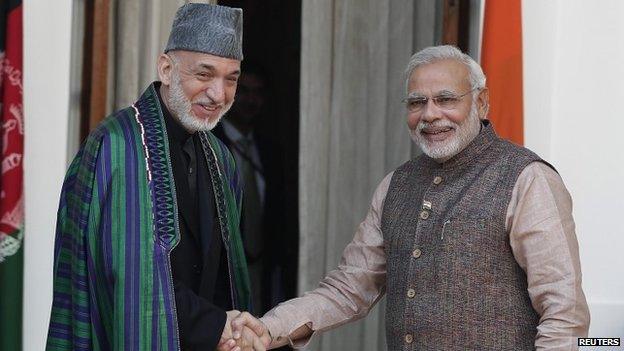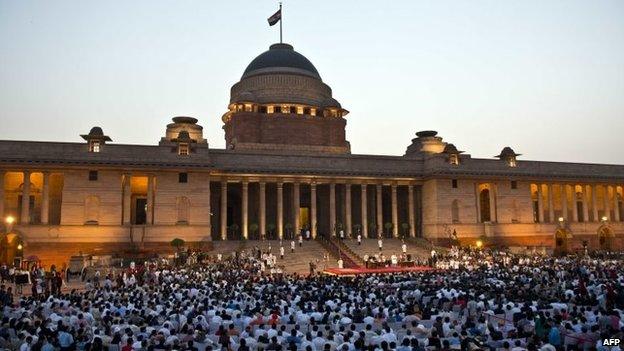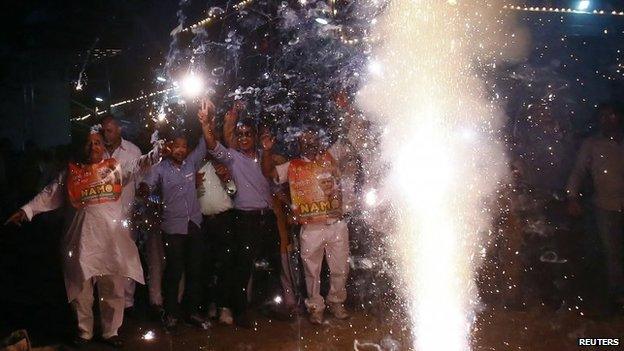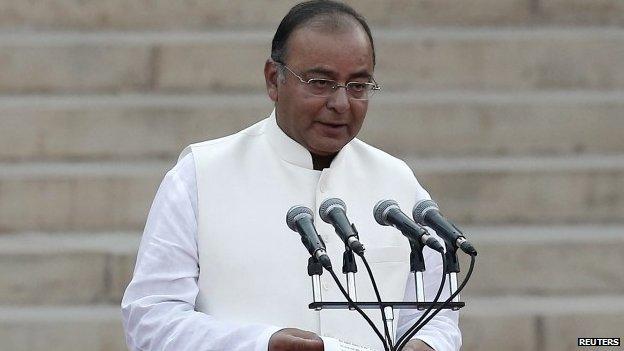India PM Narendra Modi presses Pakistan's Sharif on militants
- Published
The BBC's Nitin Srivastava in Delhi says the smiles and handshakes between the pair have been "a shock"
India's new PM Narendra Modi has urged his Pakistani counterpart to crack down on militants and speed up the trial of the 2008 Mumbai attacks suspects.
Mr Modi held bilateral talks with Nawaz Sharif on his first day in office.
The Pakistani leader said they should put the "legacy of mistrust" behind them and work for peace and stability.
Mr Sharif attended Mr Modi's swearing-in on Monday, amid hopes of a thaw in relations between the rivals who have fought three wars since independence.
Mr Modi also "underlined our concerns related to terrorism", Indian Foreign Secretary Sujatha Singh said after the talks.
"It was conveyed that Pakistan must abide by its commitment to prevent its territory and territory under its control from being used for terrorism against India."
The two sides discussed trade and the "PM said the two countries could immediately move towards normalising trade ties", Ms Singh said, adding that the foreign secretaries would "meet soon" to carry forward the bilateral agenda.
In a brief statement, Mr Sharif described the talks as "good and constructive" and said they were held in "a cordial atmosphere".
"We agreed that our meeting in Delhi should be a historic opportunity for both our countries... This provides us the opportunity of meeting the hopes and aspirations of our peoples that we will succeed in turning a new page in our relations," he said.
Nawaz Sharif said India and Pakistan must "work together"
Nuclear-armed rivals India and Pakistan have a deep history of mistrust and the BJP advocates a tough stance on Pakistan.
Mr Modi himself is viewed with suspicion by many in Pakistan because of the deadly 2002 anti-Muslim riots in Gujarat while he was the state's chief minister.
But in a surprise move, Mr Modi last week invited Mr Sharif to his inauguration and for bilateral talks.

Mr Modi is meeting South Asian leaders on Tuesday. Hamid Karzai of Afghanistan was first

Monday's swearing-in ceremony was held in the forecourt of the presidential palace in Delhi

BJP supporters lit fireworks to celebrate Narendra Modi's inauguration outside the BJP office in Delhi
On Tuesday, Mr Modi also held bilateral talks with Afghan President Hamid Karzai, and Ms Singh said the prime minister thanked him for help in dealing with last week's attack on an Indian diplomatic mission in Afghanistan's Herat province.
In an interview with an Indian TV channel on Monday, Mr Karzai blamed the attack on Lashkar-e-Taiba, a militant group based in Pakistan. India has also blamed the group for Mumbai attacks.
Mr Modi also held bilateral talks with the Sri Lankan President Mahinda Rajapaksa, Nepal PM Sushil Koirala and leaders of Maldives, Bhutan, Mauritius and Bangladesh.
Mr Sharif's presence at Monday's historic swearing-in was the first time since India and Pakistan won freedom from Britain in 1947 that a prime minister from one state had attended such a ceremony in the other.
Forty-five MPs, including seven women, from Mr Modi's BJP party and their allies were also sworn in as ministers.

India's new ministers

Arun Jaitley has been appointed the new finance and defence minister
Rajnath Singh: Home
Sushma Swaraj: Foreign affairs
Arun Jaitley: Finance, defence, corporate affairs
Nitin Gadkari: Road transport and highways, shipping
M Venkaiah Naidu: Urban development, housing and urban poverty alleviation, parliamentary affairs
DV Sadananda Gowda: Railways
Najma Heptullah: Minority affairs
Smriti Irani: Human resource development
Dr Harsh Vardhan: Health and family welfare
